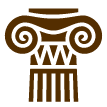Freegate
Founded 3,500 years ago, the city of Freegate lies on the coast of the Gulf of Akados at the mouth of the Talamerin River, making it a vital seaport and an important trade hub for the sprawling metropolis of Bard’s Gate to the west. While known as Freegate in most circles, some residents still retain the title of Porta Librum as it is referred to in High Boros. Freegate remains true to its Hyperborean roots, as evidenced by the organization of its armed forces. The City Legion numbers 4,096 soldiers, roughly 1,000 men and women short of a full strength, classical legion, but in times of all-out war, the city can levy additional troops from the populace to form new legions with colorful names such as the Death’s Head Legion. Praetor Julius Marcinius leads the City Legion, making him the de facto commander-in-chief of Freegate’s ground forces. Freegate’s fleet of six triremes under the command of the navarch with a ploiarch captaining each individual vessel, protects its interests at sea along with a small flotilla of ships from Bard’s Gate. These forces came to the aid of their western ally during the Huun invasion a few years earlier. High walls surround the city and provide an added measure of protection against invasion.
In keeping with its Hyperborean traditions, citizens still speak High Boros, and the city maintains an active arena district with a gladiatorial circuit. Hyperborean currency also circulates among the populace, though coins minted in Bard’s Gate are also commonly exchanged for various goods and services within the city. Marble fountains sculpted into the likenesses of historical figures and revered deities abound throughout the settlement, fed by the waters from a subterranean tributary coursing through an extensive network of underground cisterns and pipes. People routinely gather around these water distribution centers to discuss daily gossip and also stump for political office. Each fountain represents an individual electoral district from which residents select a local magistrate and a member of their ruling council, a legislative body of 28 individuals who govern the city. Praetor Julius Marcinius presides over the council’s meetings and serves as the deciding vote in the event of a tie. Although he technically serves as an administrator and advisor to the group, the undying support of his troops lends great power to his voice and gives him tremendous influence over their decisions. The praetor remains dedicated to the principles of the republic. He maintains a healthy respect for vigorous debate and the right to disagree with his viewpoint, regardless of how misguided it may seem to him. For their part, praetors negotiate trade agreements with Bard’s Gate and other partners, appoint diplomats to project the city’s interests in strategic settlements throughout the region, and codify the city’s laws and doctrines. Commissary Helios Pousalaki, an aging wine merchant and member of the council, holds the critical post of ratifying all trade transactions for the city. On most nights, he can be found at The Trireme outside the city. The 725 members of the city watch enforce the council’s edicts within Freegate. Because of their close ties to the Suzerainty of Bard’s Gate, outsiders erroneously relegate Freegate to colonial or commonwealth status, yet Freegate retains its unique identity of indigenous and Hyperborean culture. The city shares a reverence for Thyr and Muir, though its people also worship Zadastha, the goddess of love in her temple, which also houses a magnificent winery.
The consuls currently have their hands full dealing with the lingering effects from the unexpected Huun invasion. Intrigue always festers in Freegate’s sewers, and rumors about wererats, snake people, and other boogeymen from children’s stories hiding in the dank tunnels below the streets circulate practically everywhere.
Settlement
Freegate, City of
Type
City
Owning Organization











Comments